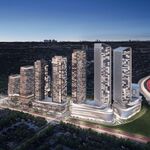James
Senior Member
An interesting short write-up in the Globe and Mail today:
http://www.theglobeandmail.com/repo...ation-why-thats-a-good-thing/article21531854/
Why we shouldn’t fear a crash in Canada's three hottest housing markets
MICHAEL BABAD
The Globe and Mail
Published Tuesday, Nov. 11 2014, 7:49 AM EST
Housing and demographics
Amid all the hand-wringing over Canada’s housing market comes an interesting finding from BMO Nesbitt Burns: Homebuilding is “largely tracking” demographics in three cities that are the focus of the angst.
“And that’s a good thing,” said senior economist Robert Kavcic.
Mr. Kavcic’s research finds, for example, residential construction starts, while at record levels, has “followed an explosion in population growth” of more than 4 per cent year over year.
“In Toronto, starts are actually at 4 ½-year lows as population growth has cooled,” he added.
“That might be a bit surprising given all of the cranes, but current construction largely reflects the boom in starts during 2012 and 2013 – activity has since slowed meaningfully.”
What this suggests, Mr. Kavcic said, is that there’s no real overbuilding and, thus, no meltdown on the horizon.
As The Globe and Mail’s David Parkinson reports, housing starts across the country declined in October to an annual pace of 183,600, down from September’s 197,400 and well below what economists had projected.
Work on condos, in particular, slowed. And this is expected to ease further, according to Canada Mortgage and Housing Corp.
The focus in Canada is on Vancouver, Calgary and Toronto, where prices are running hot.
Most recently, the Bank of Canada has said other markets are showing signs of a soft landing.
That’s not to suggest that the central bank is saying those three cities are in trouble, but some economists have taken it as a warning. Having said that, no one is calling for a crash.
“Canadian housing is one of those weird areas of economic activity where a downside surprise in the data is generally treated as a positive – indeed, the softer-than-anticipated print is likely a welcome data point for policy makers," said chief economist David Rosenberg of Gluskin Sheff + Associates.
"It indicates that homebuilding is not losing its moorings as the latest reading is generally consistent with the underlying trend in Canadian household formation,” he added , referring to the housing starts.
“Further, the fact that the weakening in activity in October was specifically centered in the condo segment – the area most associated with overbuilding concerns – is likely another welcome development.”
The trend over the past six months is “well above” what’s required to match population growth, noted economist Brian DePratto of Toronto-Dominion Bank.
“Despite robust trend starts, we continue to expect a gradual slowing of Canadian housing activity towards levels supported by demographics (about 180,000 units) by the end of next year,” he said.
“A gradual rise in interest rates, along with the moderate level of overbuilding will help moderate housing activity.”
http://www.theglobeandmail.com/repo...ation-why-thats-a-good-thing/article21531854/
Why we shouldn’t fear a crash in Canada's three hottest housing markets
MICHAEL BABAD
The Globe and Mail
Published Tuesday, Nov. 11 2014, 7:49 AM EST
Housing and demographics
Amid all the hand-wringing over Canada’s housing market comes an interesting finding from BMO Nesbitt Burns: Homebuilding is “largely tracking” demographics in three cities that are the focus of the angst.
“And that’s a good thing,” said senior economist Robert Kavcic.
Mr. Kavcic’s research finds, for example, residential construction starts, while at record levels, has “followed an explosion in population growth” of more than 4 per cent year over year.
“In Toronto, starts are actually at 4 ½-year lows as population growth has cooled,” he added.
“That might be a bit surprising given all of the cranes, but current construction largely reflects the boom in starts during 2012 and 2013 – activity has since slowed meaningfully.”
What this suggests, Mr. Kavcic said, is that there’s no real overbuilding and, thus, no meltdown on the horizon.
As The Globe and Mail’s David Parkinson reports, housing starts across the country declined in October to an annual pace of 183,600, down from September’s 197,400 and well below what economists had projected.
Work on condos, in particular, slowed. And this is expected to ease further, according to Canada Mortgage and Housing Corp.
The focus in Canada is on Vancouver, Calgary and Toronto, where prices are running hot.
Most recently, the Bank of Canada has said other markets are showing signs of a soft landing.
That’s not to suggest that the central bank is saying those three cities are in trouble, but some economists have taken it as a warning. Having said that, no one is calling for a crash.
“Canadian housing is one of those weird areas of economic activity where a downside surprise in the data is generally treated as a positive – indeed, the softer-than-anticipated print is likely a welcome data point for policy makers," said chief economist David Rosenberg of Gluskin Sheff + Associates.
"It indicates that homebuilding is not losing its moorings as the latest reading is generally consistent with the underlying trend in Canadian household formation,” he added , referring to the housing starts.
“Further, the fact that the weakening in activity in October was specifically centered in the condo segment – the area most associated with overbuilding concerns – is likely another welcome development.”
The trend over the past six months is “well above” what’s required to match population growth, noted economist Brian DePratto of Toronto-Dominion Bank.
“Despite robust trend starts, we continue to expect a gradual slowing of Canadian housing activity towards levels supported by demographics (about 180,000 units) by the end of next year,” he said.
“A gradual rise in interest rates, along with the moderate level of overbuilding will help moderate housing activity.”




